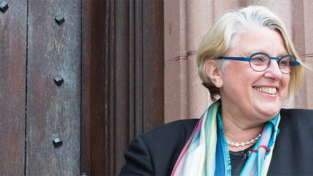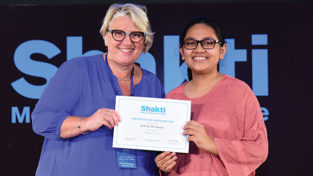President’s Pen: Spring 2015
A few years ago, Anne-Marie Slaughter created a firestorm when her article “Why Women Still Can’t Have It All” was published in The Atlantic. Slaughter begins her piece by recounting a talk she delivered on “work-family balance” to a group of Rhodes Scholars and reports that nearly all of the women in the room not only assumed but accepted that they would have to make compromises that their male counterparts would not have to make.
The question of whether women can really have it all was one of the central issues addressed at the inaugural Mount Holyoke Asian Alumnae Symposium held in Hong Kong last November. I had the privilege of serving on a panel with alumnae from classes in the 1970s through 2008, facilitated by national correspondent Lisa Belkin, that debated the questions raised by Slaughter’s commentary. Is it possible to be an executive and also lead a balanced life? How can we make work-life balance not just a “women’s problem”? What are the strategies and factors to consider when deciding to leave a career or rejoin the work force? Will there ever be time to go on a date?
As I sat down next to the other panelists, I couldn’t help but think of something I’d read recently about the tensions women feel between home and work. “We cannot believe it is fixed in the nature of things that a woman must choose between a home and her work, when a man may have both. There must be a way out and it is the problem of our generation to find a way.” That quotation? From the Smith College Weekly student newspaper. In 1919. Certainly the struggle to find balance is nothing new. But during our discussion, one question stopped us in our tracks.
What is one thing you won’t compromise on? I had to think a moment and then realized that, for me, it’s dinner. When I was a vice provost at the University of Rhode Island, I often worked late. Given the hour-and-a-half commute home, I arrived well after our usual dinnertime. But an evening meal with my husband and our twin sons was critical to our family and our mutual well-being—a chance to slow down and catch up. When he knew I was near, my husband, John, would get the water boiling for spaghetti, prepare ingredients for broccoli melts, or jump in the car with the boys to meet me halfway at a restaurant. Those late-night meals were worth it because they bound our family together. They still do.
Today there are even greater pressures on families. I know Bridget Barrett, senior administrative assistant of the College’s Gender Studies and Film Studies departments, maintains the same family dinner tradition. With six people and three generations gathering at Bridget’s table, it can be difficult to enforce. One new rule has been added at the Barretts’ table: no screens. When it comes to texting, Bridget is unequivocal. “Put that away,” she says.
Marcella Jayne FP’13 is another woman who frequently wrestles with the issue of compromise. Marcella is a single mother of two who attends Fordham Law School. Committed to a future in public service law, she knows the financial rewards won’t be great, and she recognizes the sacrifices her daughters have already made. “It’s an internal dialogue I have ten times a day,” she says. Yet, Marcella asks, “What kind of a mother would I be if I didn’t show my children how important it is to stand for what I believe?”
Standing for what we believe. Until we create a world in which the full range of every person’s existence is valued, we will continue to feel the same tension women experienced nearly one hundred years ago. Until then, we will eat late-night broccoli melts, take away the cell phones yet again, and have that same conversation that we’ve had with ourselves so many times before.
The most important stand we take is often the one we make when we’re most depleted. In confronting the empty tank, we remind ourselves what matters most.
—By President Lynn Pasquerella ’80
This article appeared in the spring 2015 issue of the Alumnae Quarterly.
April 13, 2015











Leave a Reply